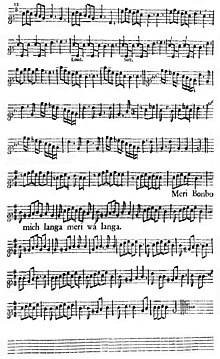"Koromanti" refers to three separate songs from 17th-century Jamaica, which are the earliest extant songs of enslaved Africans. They are also the earliest examples of Afro-Caribbean and Afro-Atlantic music.[1] The music was transcribed by the otherwise unknown Mr. Baptiste in 1688 during a festival, upon the request of Anglo-Irish physician and naturalist Hans Sloane. "Koromanti", alongside transcriptions of the songs "Angola" and "Papa", was published in Sloane's A Voyage to the Islands Madera, Barbados, Nieves, S. Christophers and Jamaica in 1707.[2][3]

References
editCitations
edit- ^ Dubois 2016.
- ^ Rath 1993, p. 701.
- ^ McNeill 2019.
Sources
edit- Dubois, Laurent (8 August 2016). "Circle Unbroken". Duke Magazine. No. Special 2016 Issue. Retrieved 17 March 2024.
- McNeill, Brian (23 May 2019). "Who was Mr. Baptiste?". VCU News. Virginia Commonwealth University. Retrieved 17 March 2024.
- Rath, Richard Cullen (October 1993). "African Music in Seventeenth-Century Jamaica: Cultural Transit and Transition". The William and Mary Quarterly. 50 (4): 700–726. doi:10.2307/2947472. JSTOR 2947472.
Further reading
edit- Blackburn, Robin (1997). The Making of New World Slavery: From the Baroque to the Modern, 1492-1800. London: Verso Books. pp. 347–349. ISBN 978-1-85984-890-6.
- Lingold, Mary Caton (2020). "Digital Performance and the Musical Archive of Slavery: "Like Running Home"". Studies in Eighteenth-Century Culture. 49: 109–125. doi:10.1353/sec.2020.0009.
- Lingold, Mary Caton (February 2021). "In search of Mr Baptiste: on early Caribbean music, race, and a colonial composer". Early Music. 49 (1): 49–66. doi:10.1093/em/caab002.
- Roberts, Helen H. (1926). "Possible Survivals of African Song in Jamaica". The Musical Quarterly. 12 (3): 340–358. doi:10.1093/mq/xii.3.340. hdl:2027/uc1.b4440340. JSTOR 738243.
External links
edit- Interactive website with recordings and commentary of the Mr. Baptiste's five transcriptions
- Modern realization of Koromanti #1
- Modern realization of Koromanti #2